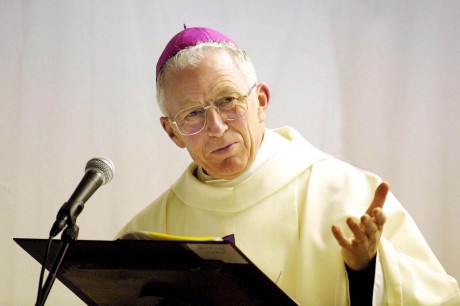It’s ironic that a secularist is seeking to use the criminal law to prevent free speech, writes Rory Fitzgerald
A remarkable story emerged this week: The Director of Public Prosecutions (DPP) is considering prosecuting Bishop Philip Boyce of Raphoe for inciting hatred against secularists. This offence can carry a penalty of up to two years imprisonment.
The complaint was made by John Colgan, of Leixlip, Co. Kildare.
He took exception to a line in one of the bishop’s homilies, which stated that the Irish Church is ”attacked from outside by the arrows of a secular and godless culture”.
Mr Colgan, a self-described secularist, told The Irish Catholic this week that: ”From my perspective, that was very angry language.”
He said that such statements ”adversely affect the respect with which secularists are held by Catholics”.
Mr Colgan is a former leader of ‘the Campaign to Separate Church and State’ who once stood for Fine Gael in the 1982 general election, but is no longer a member of the party.
Bishop Boyce’s homily was delivered at Knock Shrine last August during the annual novena. After reading about it in the press, Mr Colgan wrote to Bishop Boyce asking that he retract his ‘offensive’ statement.
The bishop replied to Mr Colgan’s letter saying he ”did not wish to disparage in any way the sincere efforts of those with no religious beliefs, atheists, humanists, etc.
”I have too much respect for each human person, since I believe all are created in the image of God,” the bishop said in his letter.
However, ”after reflecting upon it,” Mr Colgan decided to report Bishop Boyce to the gardai¨ for an alleged infringement of the Incitement to Hatred Act (1989).
Having reviewed the legislation, it seems most surprising that a file was sent to the DPP at all. The bishop does not single out the members of any particular group: He merely refers to a broadly hostile ‘culture’ existing in Ireland. It also seems unlikely that atheists would be considered a religious group within the meaning of the legislation.
Crucially, the homily appears to contain nothing whatsoever that would incite an ordinary person to hate. Nor does the act exist in a vacuum: It must be viewed in light of the constitutional right to free speech, as guaranteed by Article 40.6.1(i) of the Constitution. This fundamental right can only be circumscribed where statements ”undermine public order or morality or the authority of the State”.
The bishop’s comment cannot reasonably be said to have done this.
The issue of freedom of religion must also be considered. This is protected by Article 9 of the European Convention of Human Rights and Article 44 of the Constitution which pledges the state to ”respect and honour religion”.
It is also a defence under the Act to show that you did not intend ”to stir up hatred” by the words used, and that you were ”not aware that they might be, threatening, abusive or insulting”. It would seem obvious to most impartial observers that the bishop had no such intent or awareness.
There is also some irony in the fact that Mr Colgan is seeking to use the criminal law to prevent speech critical of secularism. In a way, to do so is to say: ”Thou shalt not blaspheme against secularism.”
Opposed
Yet Mr Colgan is strongly opposed to Ireland’s blasphemy law, which would restrain ”grossly abusive or insulting” statements about religion. If ”grossly abusive” statements about religion should be permitted, then why should a bishop face criminal charges for criticising secular culture?
Mr Colgan says he ”accepts entirely” that ”there is an issue of freedom of speech and how far it should be constrained”.
If we reverse the bishop’s statement, a double standard becomes apparent. Imagine if a leading Irish atheist said: ”The secular movement is attacked from outside by the arrows of Ireland’s Catholic and godly culture”.
I doubt any Irish Catholic would find that remotely offensive. Nobody would suggest that this is ”incitement to hatred” against Catholics.
For a start, the finger is not pointed at Catholics, but at the nation’s culture – a far more ethereal concept. In the highly unlikely event that this comment was reported to the gardai¨, there would be much laughter down at the station – and no file would be sent to the DPP.
Mr Colgan agrees that some clergy feel victims of hatred incited against them in Irish culture: ”I have a great deal of sympathy for priests and bishops, I have some priests who are friends…they are under fierce pressure at the moment”.
He also recalled being mistaken for a priest on the street and seeing ”a sort of despising look” on people’s faces.
In speaking to him, Mr Colgan seemed genuinely offended by the bishop’s statement and sincere in his belief that Bishop Boyce ”may have meant to make a scapegoat of secularists” ahead of the publication of the Raphoe Report.
Yet, however offended he felt, we may be thankful that the Irish criminal law does not jail people for making offensive statements. If it did, we would all be in jail.
Given that it seems extremely unlikely that the bishop committed any criminal offence, the decision to forward a file to the DPP is very strange.
Where once gardai¨ wrongly thought that clerics could do no wrong, do they now think that they can do no right? If so, could this be because of the dramatic rise of anti-clerical sentiment in Irish culture in recent years?
Mr Colgan and the investigating gardai¨ may have done more than they know to prove the bishop right.


 Rory Fitzgerald
Rory Fitzgerald
